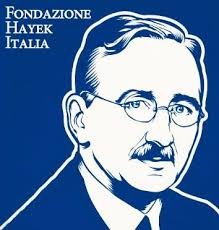by Giuseppe Mazzei
The liberal theory of society was not born in Italy, nor has it ever taken firm root in our country. For that very reason, it is often the subject of misunderstandings and distortions, which make it appear to be what it is not. The favorite target of anti-liberals of all latitudes is very often Friedrich A. von Hayek, the greatest liberal-oriented scholar of the 20th century. We discuss this with Lorenzo Infantino, professor of Philosophy of Social Sciences at LUISS, who edited the Italian edition of many of Hayek's works (most recently, Knowledge and social process, Rubbettino Publisher) and who is himself one of the foremost connoisseurs, internationally, of liberal theory.
D. What contribution can Hayek's reading make to our defense of democratic systems today? Or, if you will, in what does the topicality of Hayek's thought consist?
R. Hayek has over the years developed a broad theory of society. His greatest merit was that he revisited classical liberalism and provided us, after two world wars and the rise of totalitarianism, variously articulated, with the tools to defend individual freedom of choice. Although initially known for what he did in the field of economic science, he was also involved in theoretical psychology, theory of knowledge and political philosophy. Through painstaking and continuous work, spanning several decades, he identified the conditions that allow freedom to be not an empty declamation, but an institutional arrangement, in which each person can peacefully cooperate with the other, mobilize his knowledge and resources, without having to submit to a compulsory hierarchy of ends.
D. Can you tell us more about that?
R. The overriding problem of social life is how to make the actions of human beings mutually compatible. From its origins, liberalism has turned its back on the belief that this is the task of particular individuals or groups, endowed with privileged knowledge. And it has relied on the "rule of law." This means that the demarcation of boundaries between actions is not imposed by a higher authority, which dictates the content of each person's life. It is determined by the rule of law, which does not prescribe any obligation except that of not harming one's neighbor. Hayek insistently shed light on the meaning of "rule of law." He made us understand that individual freedom of choice, even before being a political concept, is a legal concept.
D. Hayek's name, however, is associated with the "neoliberalism" understood as an unrestrained conception of social life, that is, as the blind pursuit of profit, without any consideration for social consequences. Is such an association possible?
R. Already the term "liberalism," introduced derogatorily in the late 19th century, sets us on the wrong track. The word has no equivalent in other languages. If by "liberalism" or "neo-liberalism "we mean referring to individual choice in the use of resources, we must resign ourselves to the understanding that, without this, no freedom is possible. Ever since Plato, all those who have opposed freedom have called for the suppression of private property or its "neutralization" through a complex system of limitations and controls. But there is more. Since resource mobilization is the outcome of knowledge mobilization, preventing the former is tantamount to preventing the latter as well. The free unfolding of the social process, which is at the same time a process of exploring the unknown and correcting errors, is thus made impossible or tampered with. The consequence of this is an obvious fall in productivity and our well-being.
D. Piketty includes Hayek among the representatives of a censorious conception of democracy, speaks of a "consistent and invincible ordoliberal and proprietarian conspiracy" and alludes to much more. What to say?
R. Piketty blames Hayek for many things. But he does not compare ideas or examine consequences. In a style that belongs more to "political traders" (Weber) than scholars, he places Hayek among those who even blame poverty. To understand Piketty, one must turn to George Orwell, who provided us, with reference to the totalitarian universe, with the concept of "neo-language." In the new language, war stands for peace, freedom for slavery, and so on. Here, when he attacks the work done by Hayek on "rule of law," Piketty is using neolanguage, in which individual freedom of choice, made possible by law, becomes slavery. As for the accusation that in the Chicago years he was a supporter of Pinochet's dictatorship, suffice it to say that Hayek returned to Europe long before that affair and that, after those events, to which he was totally uninvolved, he was awarded a Nobel Prize. Something that would have been precluded from his eventual involvement, albeit ideal.





